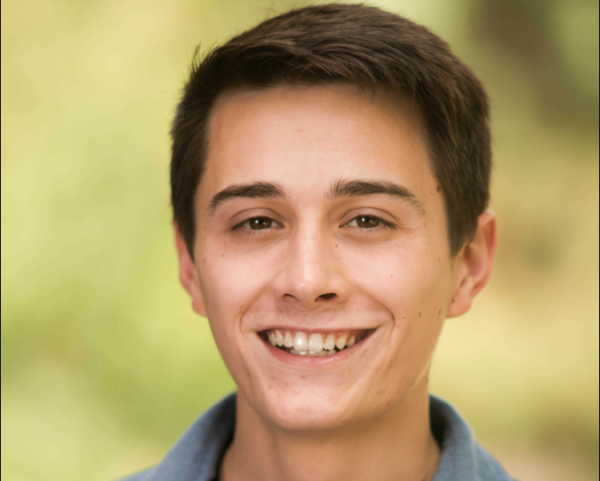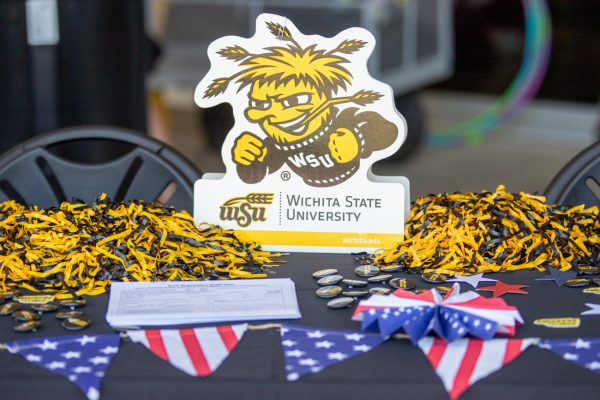Fostering a friendship: WPD officers of color lead community discussion
On Wednesday afternoon, the Wichita Police Department partnered with Wichita State’s Office of Diversity and Inclusion for a Brown Bag Discussion about what it’s like to be an officer of color in today’s society. Capt. Jay McLaurian discussed officer’s lives off-duty saying, “We live here. This is our community too.”
Cops are people too.
They wear uniforms, write tickets and make arrests. But they take off that uniform at the end of the day and live a normal life.
“I work in the community, I socialize in the community,” Wichita Police Capt. Clay Germany said at a Brown Bag Discussion at Wichita State. “I don’t always wear this uniform. We’re all the same. I just happen to do this as my job. That’s what we have to realize. We all are people. We wear uniforms, we have a job we have to do. But guaranteed I’m going to respect you. Some days I can just shake your hand. Sometimes I have to ask you to turn around. I got to take care of this. That might be my brother, that might be my cousin.”
To help bridge the cop-citizen gap, Germany and four other WPD officers — Capt. Jay McLaurian, Lt. Lemuel Moore, Sgt. Wendell Nicholson and Deputy Chief Jose Silcado — led a discussion Wednesday that focused on the tension between police and people of color. The Office of Diversity and Inclusion sponsored the event.
Topics touched on included “bad apple” officers, Wichita’s First Steps BBQ, the community-police relationship, effective protesting and the experience of being an officer of color, among others.
The officers collectively agreed bad apples are in every profession. They emphasized that the best deterrents are good training and community dialogue.
“If you don’t address bad conduct right then when it happens, it’ll spread like cancer,” Nicholson said. “The way I was taught 23 years ago by my lieutenant is you treat everybody the way you want to be treated. That’s pretty easy. Doesn’t make a difference if you’re green, black, white, orange. You treat people the way you want yourself to be treated.”
McLaurian said the stereotypical bad cop image has been perpetuated by movies.
“You think a glaring cop is out there snorting cocaine and slapping people,” McLaurian said. “It’s not like that at all. That’s a movie or TV misconception. We usually don’t have that or tolerate that. One thing we do is talk a lot. If you’re a dirty cop it will be found out pretty quick. We don’t tolerate that amongst ourselves.”

When asked about Wichita’s First Step BBQ, in which Wichita Police Chief Gordon Ramsay invited the community to eat and mingle with local law enforcement, the officers stressed the importance of a strong community relationship.
“I think it’s important that we speak with the community and get to know the community,” McLaurian said. “It’s important to make people see we are real people too.”
Salcido compared Wichita’s community-cop dynamic to that of Chicago’s.
“The (Chicago) murder rate is pushing 600 for the year,” Salcido said. “That’s because they took a strict enforcement approach. They don’t get out of their cars. If you have bad relations with the community and are strictly an enforcer, not a guardian, then you’re never going to be able to enforce.”
One audience member asked the officers what they consider effective and civil protesting, bringing up Colin Kaepernick kneeling during the National Anthem.
Sgt. Nicholson said he has no problem with Kaepernick’s protest, calling it an effective example.
“He’s not shooting anybody,” Nicholson said. “It’s a silent protest. He made a choice as an individual. I myself don’t feel slighted as a police officer when someone says I feel mad about what the police have been doing. The police have done some things on these high profile cases. We all are offended. Like I said earlier, we work for you guys. I also said that if any person feels they’ve been treated unfairly, that’s a problem for all of us. We can only control what we do here in Sedgwick County. We have no control over what happens in Baltimore. We try to be proactive and make sure those issues don’t happen here.”
Coming full circle, McLaurian said that the tensions felt between people of color and cops are a societal issue that has been around for decades.
“All lives matter,” McLaurian said. “Period. But I think it goes back to respect of everybody, and I think we’ve lost respect of each other. We violate respect of each other on a daily basis. I think that we need to look at how to fix our society. Something has went wrong in America. I don’t know what it is. You can say its racism, but something’s went wrong and its ballooned and exploded. Until we figure out what we’re doing wrong as Americans, we’re going to continue to have these issues.”
Salcido said the best way to see eye to eye on racial and police issues is to put yourself in the other person’s shoes.
“If we thought the same way on everything, we wouldn’t be the same,” Salcido said. “Really, instead of looking at blue lives, black lives, whatever, I think we need to get in the shoes of the other person.
“The more we know, the less fearful we are. We can harness that strength. We can correct that. America’s strength is its diversity.”

Andrew Linnabary was the 2018-2019 Digital Managing Editor of The Sunflower. He studied journalism and minored in English. Linnabary is from Wichita, Kansas.

Hannah Roberts was a photographer for The Sunflower. Roberts majored in entrepreneurship and minored in communications. She was born and raised in Wichita,...













